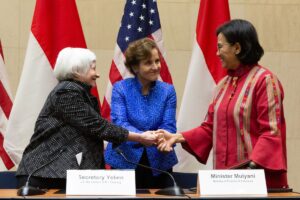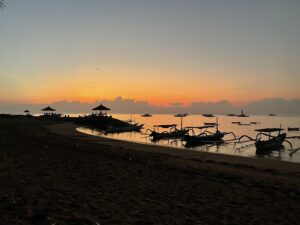<< Back to Media
In Jakarta, WBD Supports the MCC Indonesian Infrastructure and Finance Compact
September 21, 2023
For two weeks in June 2023, WBD’s International Team embarked on a mission to Indonesia to assist with designing the Millennium Challenge Corporation’s (MCC) Indonesia Infrastructure and Finance Compact: a $649 million five-year grant to the Government of Indonesia to address economic growth constraints. MCC’s investments in partner countries are complex and meticulously designed, requiring the creative problem-solving skills of experts and drawing upon international best practices. In Jakarta, Indonesia’s capital and the largest city in Southeast Asia, WBD’s finance experts and management consultants will continue assisting MCC in adapting existing development strategies to the Indonesian context and creating new solutions.

Courtesy of MCC: On April 13, 2023, U.S. Secretary of the Treasury Janet Yellen and Indonesian Minister of Finance Sri Mulyani Indrawati signed the $649 million Indonesia Infrastructure and Finance Compact .
“The compact signed today will focus on sustainability and scalability, improving the country’s resilience against climate change and other external shocks while creating more opportunities for business owners to access market capital.”
— Secretary Janet Yellen, U.S. Secretary of the Treasuty and Vice Chair of MCC’s Board of Directors.
One of the primary constraints to economic growth, which WBD is helping MCC to tackle, is the chronically low access to finance faced by Indonesian owners of Micro, Small, and Medium Enterprises (MSMEs), especially women. While in Indonesia, WBD’s experts met with government officials, bankers, international organizations, and even MSMEs to refine a solution for this constraint.
Why MSME Access to Finance Matters
MSMEs represent around 90 percent of all firms globally, providing more than half of total employment and contributing between 50 and 70 percent of the global GDP, amounting to $66 trillion annually. Their predominance is even more pronounced in Indonesia:
- Indonesian MSMEs absorb 97 percent of Indonesia’s domestic employment.
- 99.99 percent of businesses in Indonesia are MSMEs.
- Indonesian MSMEs contribute over 61 percent of Indonesia’s total GDP.
- With over 62 million MSMEs, there is one MSME for every five Indonesians

Woman shopping in an Indonesian market.
The statistics effectively highlight the integral role MSMEs play in the Indonesian economy. When walking along a typical Jakarta street, one cannot help but marvel at the small enterprises filling every available niche, whether on carts, rickshaws, or streetside stalls. The vitality of Indonesia’s MSME sector is not just numerical; it’s tangible.
Micro- Small- and Medium-Enterprises form the backbone of the Indonesian economy, and a critical factor in the country’s future growth lies in turning these small businesses into larger ones. However, the widespread inability to access formal financing options, such as bank loans, limits the growth of Indonesia’s MSME sector.
Despite their substantial economic presence, MSMEs in Indonesia receive the lowest share of bank loans in the ASEAN region, with only one-fifth of total bank loans directed towards them. More than 70 percent of Indonesian MSMEs lack access to credit, with an estimated $165 billion gap in financing. While many Indonesians deride financial service providers as rapacious, poverty has far more to do with their absence than their presence. Efficient credit allows borrowers to transform their entrepreneurial aspirations into a consistent, long-term source of income. But without access to finance, MSMEs are forced to rely on internal funds or cash from friends and family to launch and grow their enterprises.
Women-owned MSME Challenges
Notably, women-owned and women-led MSMEs (W/MSMEs), who make up approximately 65 percent of the MSME sector in Indonesia, face particularly formidable challenges when seeking access to loans. Since their property is often registered under their husbands’ names, W/MSMEs find it difficult to pledge the required loan collateral. They also encounter obstacles due to elevated repayment risks, excessive interest rates, and the burden of multiple outstanding loans. Furthermore, W/MSMEs face an additional challenge: the delicate balance between managing their businesses and domestic responsibilities, underscoring the dual role women often play in their daily lives.
Addressing these challenges and unlocking financial inclusion for MSMEs, especially women-owned and women-led enterprises, is not only vital for their growth but also for the overall economic development of Indonesia.
How MCC and WBD are Helping
The Millennium Challenge Corporation is helping to close the financing gap for MSMEs through supply-side (financial service providers, or FSPs) and demand-side (MSMEs) interventions. On the supply side, a revolving MCC fund called the “On-Lending Window” (OLW) will provide money to FSPs for MSME lending. The funds FSPs receive through the OLW will allow them to make new loans to MSMEs with reduced interest rates and collateral requirements. In addition, FSPs will receive technical assistance to support their MSME loan origination capabilities.
On the demand side, MSMEs will receive training on formalization, permitting, financial literacy, and a range of other topics that will improve their eligibility for credit. These interventions will result in FSPs that are more able and willing to lend to MSMEs and equipped with a pipeline of newly creditworthy MSMEs.

Sunar, Bali. July 2023. WBD.
The design of these complex interventions can only advance from co-creation with MCC’s in-country partners. The co-creation process is why MCC and WBD traveled to Jakarta in mid-June. Both teams spent the first week in Jakarta for meetings and working sessions to flesh out the particulars of the design. During the second week, MCC and WBD traveled to the provinces to test the design with some of its intended beneficiaries to ensure it was fit for use.
Finding ourselves in the heart of Indonesia’s diverse landscapes and communities, we embraced the opportunity to engage directly with the program’s ultimate beneficiaries: MSMEs. During one conversation with a small tea producer from the Balinese countryside, the WBD team felt uplifted by her palpable entrepreneurial spirit and deeply appreciative of the privilege to empower her and others like her.
On the trip, John Sipher, a WBD consultant, said, “Speaking with this entrepreneur underscored that finance isn’t confined to spreadsheets; it’s the foundation of sustainable livelihoods for real people.”
Authors: John Sipher, Associate at Washington Business Dynamics, supports the firm’s firm’s award with MCC and other international clients.
Emily Engebretson, Associate at Washington Business Dynamics, supports the firm’s award with MCC and the Veterans Health Administration’s Office of Innovation Health Care.
